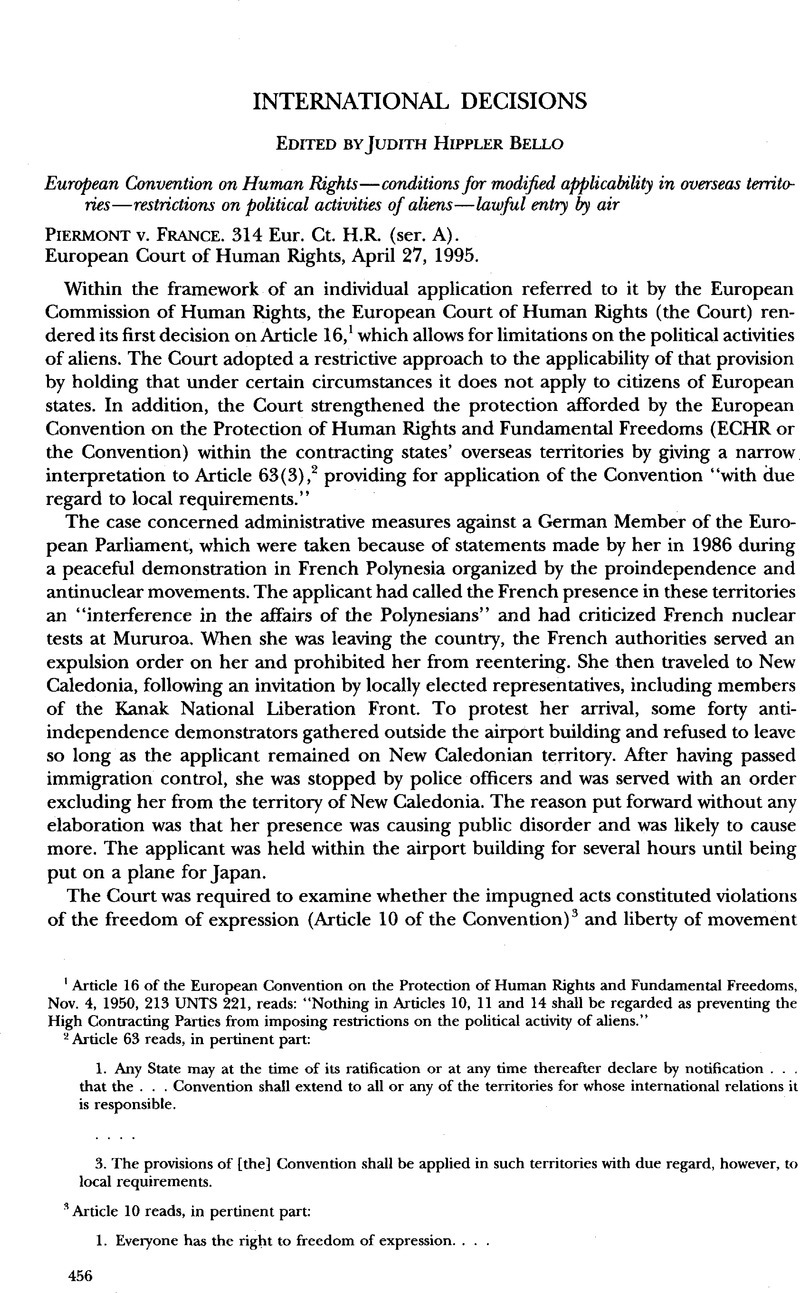No CrossRef data available.
Published online by Cambridge University Press: 27 February 2017

1 Article 16 of the European Convention on the Protection of Human Rights and Fundamental Freedoms, Nov. 4, 1950, 213 UNTS 221, reads: “Nothing in Articles 10, 11 and 14 shall be regarded as preventing the High Contracting Parties from imposing restrictions on the political activity of aliens.”
2 Article 63 reads, in pertinent part:
1. Any State may at the time of its ratification or at any time thereafter declare by notification … that the … Convention shall extend to all or any of the territories for whose international relations it is responsible.
… .
3. The provisions of [the] Convention shall be applied in such territories with due regard, however, to local requirements.
3 Article 10 reads, in pertinent part:
1. Everyone has the right to freedom of expression. …
2. The exercise of these freedoms, since it carries with it duties and responsibilities, may be subject to such formalities, conditions, restrictions or penalties as are prescribed by law and are necessary in a democratic society, in the interests of national security, territorial integrity or public safety, for the prevention of disorder or crime … .
4 Article 2(1) of Protocol No. 4, Sept. 16, 1963, Eur. TSNo. 46, reads: “Everyone lawfully within the territory of a State shall, within that territory, have the right to liberty of movement and freedom to choose his residence.” As of January 1, 1996, the Protocol had been ratified by 23 states.
5 See Commission Report, Piermont v. France, 314 Eur. Ct. H.R. (ser. A) 35, para. 76.
6 See joint, partly dissenting opinion of Judges Ryssdal, Matscher, Sir John Freeland & Jungwiert, 314 Eur. Ct. H.R. (ser. A) 31, para. 10 [hereinafter Dissenting Opinion]. This was also the Commission’s view, see Commission Report, note 5 supra, para. 96, stressing that the applicant’s inability to exercise her right to free speech was a necessary consequence of denying her access to the territory of New Caledonia.
7 See Dissenting Opinion, note 6 supra, para. 4.
8 Castells v. Spain, 236 Eur. Ct. H.R. (ser. A) para. 42 (1992).
9 While the Commission referred to the need to interpret the Convention “in the light of present day conditions,” see Commission Report, note 5 supra, para. 59, neither the Court nor the dissenters dealt with that question. 314 Eur. Ct. H.R. (ser. A) para. 64; and Dissenting Opinion, note 6 supra, para. 4.
10 As was pointed out by the Commission. See Commission Report, note 5 supra, para. 58.
11 As to the American Convention, Ulrich Wölker, Zu Freiheit und Grenzen der Politischen Betatigung von Ausländern 174 (1987), maintains a contrary view, referring to Article XXXVIII of the (legally binding) American Declaration of the Rights and Duties of Man and to Articles 29 and 1 (1) of the American Convention, which do not expressly prohibit discrimination based on nationality. However, these provisions list “national origin” among the forbidden grounds of discrimination.
12 Anthony Lester, Freedom of Expression, in The European System for the Protection of Human Rights 465, 466 (Ronald St. J. Macdonald, Franz Matscher & Herbert Petzold eds., 1993); Peter van Dijk & G.J. H. Van Hoof, Theory and Practice of the European Convention on Human Rights 561 (2d ed. 1990). The Commission expressed the view that the provision had been intended to permit unlimited restriction of the political activities of aliens. See Commission Report, note 5 supra, para. 58.
13 See Dissenting Opinion, note 6 supra, para. 4.
14 The Court stressed this point in Tyrer v. United Kingdom, 26 Eur. Ct. H.R. (ser. A) para. 38 (1978), stating that Article 63(3) was a “colonial clause” designed to adapt the Convention to territories with a lower state of civilization. This view is shared by Gérard Cohen-Jonathan, La Convention Européenne Des Droits De L’homme 95 (1989); and Jochen A. Frowein, Commentary on Article 63, in Europäische Menschenrechts-Konvention. EMRK-Kommentar No. 1 (Jochen A. Frowein & Wolfgang Peukert eds., 1985).
15 See Convention, supra note 1, Preamble, 3d consideration, and Article 64(1), respectively.
16 See Tyrer, 26 Eur. Ct. H.R. (ser. A) para. 38.
17 See Dissenting Opinion, note 6 supra, para. 3.
18 Another factor ensuring that the application of Article 63(3) will remain an exception is that the Court has maintained that the respondent government has to show that such “local requirements” exist. See Tyrer, 26 Eur. Ct. H.R. (ser. A) para. 38, and Piermont, 314 id., para. 59.
19 For a similar approach concerning the enforcement machinery of the Convention, see Juliane Kokott & Beate Rudolf, Case note on Loizidau v. Turkey, 90 AJIL 98 (1996).
20 See Commission Report, note 5 supra, para. 87, and van Dijk & van Hoof, note 12 supra, at 490, who maintain that these words mean that the admission of aliens has been left to national legislation.
21 See Dissenting Opinion, note 6 supra, para. 10.